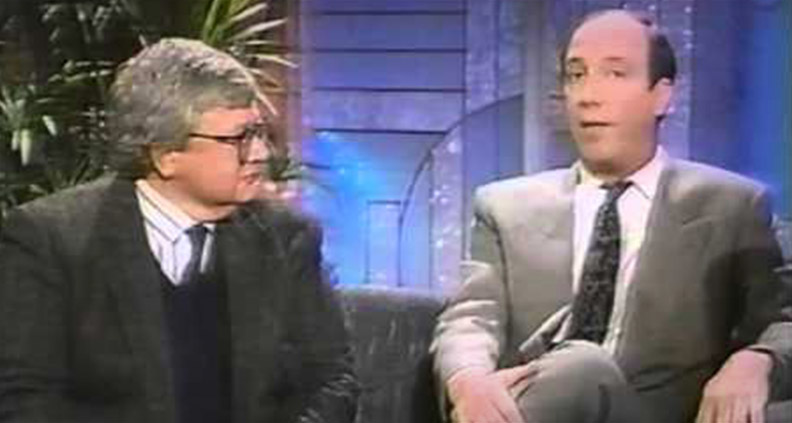Do Film Geeks Like Talking About Movies More Than They Do Actually Watching Them?
If like me you consider yourself a diehard, take-no-prisoners film geek, chances are you spend just as much time thinking about, discussing and investigating the culture of modern cinema as you do—y’know—actually watching films. Since I began keeping log of my own viewing habits in 2010, I’ve maintained an average of roughly 150 new movies watched per year. Which (if the figures generated by my trusty TI-80 graphing calculator are to be believed) works out to about three new movies a week. That’s not nearly as many as some silver screen junkies out there manage, but it’s still way more than the typical non-geek civilian.
But even so, if you saw a pie chart outlining my overall media consumption, the gross number of minutes spent ingesting features films would be hugely dwarfed by those I spend listening to film podcasts, reading movie blogs and discussing film culture over social media. Which leads me to ponder: are movies actually the thing I care about? Or are they just the excuse for a broader, interactive, multi-platform telecommunications experience I may secretly enjoy even more?

Let me make a weird comparison. Over the past year, I’ve become a huge fan of the Vermont-based jam band Phish. And in doing so, I’ve likewise become well acquainted with the rambling, hippy-burnout freak show that shadows the band, providing an omnipresent cloud of druggy dropout energy that trails behind Trey Anastasio’s and Co.’s every stray burp and fart like a jetliner vapor trail. And like the Deadhead culture of yore, Phish fans have gradually developed their own set of rituals and vocabulary, which have evolved organically over time and become codified, often independently, of any actual relationship to the band or its music.
As an observer of the Phish scene, I frequently sense a dark tension between the tangible fact of four ugly 50-something dudes playing 20-minute calypso songs about antelope and the incestuous fan community that is at once wholly dependent on the band yet completely separate from it. This, I sometimes worry, is kind of like modern film fandom is like—especially online. As movie geeks in constant digital contact with one another, we too have developed our own set of inaccessible terminology, mythology and code of ethics, which often has no real basis in or relationship to actual films or filmmaking.

Take the Bechdel Test, derived from cartoonist Alison Bechdel’s long-running Dykes to Watch Out For comic. The Bechdel Test ostensibly evaluates a film’s feminist values based on whether or not the film in question contains multiple female characters and whether if, at any point, those characters share a scene (or more) of dialogue concerning something other than a male character. On its surface this seems like a useful metric, and the test been adopted in progressive film geek circles as a necessary bar any good piece of art is expected to clear. But there are plenty of great female-empowering movies that actually fail the test, such as Alien and Run Lola Run. Conversely, there are plenty of dumb films that do that no one would consider particularly feminist (World of Warcraft, Weird Science, etc.) So even though many well-intentioned film geek types have adopted the Bechdel Test as sacrosanct to the point of gospel, it only muddies the waters of proper critical evaluation, whether specifically in regard to a film’s feminist content, or just the content of the film in general.
So I guess my neurosis around this issue is twofold. One: that actual movies may (for me, anyways) in fact be the plate rather than the steak, and two: that as film nerd culture self-perpetuates, that it’s becoming increasingly divorced from any true understanding of how movies are made or what makes them work when they’re successful, either commercially or artistically.
On the first point I think I may be safe. Even though I might spend way more time consuming media about movies than the actual movies themselves, that’s simply a matter of convenience. I can’t watch a movie while driving to work—at least not legally, or without eating into my phone’s data (I care way more about one of those things than the other). But I can listen to a podcast. I can’t watch a movie in line at the post office, but I can steal a quick glance at a blog or movie review, provided the platform they appear on is mobile-responsive enough to conform to the screen of my very-expensive smartphone.
And yes, it’s technically possible to watch a feature film on your phone—but for a purist like me? I guarantee I’ll never want to experience The Exorcist via mobile device, regardless of how many times I’ve seen it before. So in a way, my love of movies and deference to seeing them under optimal viewing conditions actually limits my ability to see more. Three movies a week is all I can currently manage.

On the second point, I’m not so sure. The democratization of film criticism and commentary has led to a wealth of movie-focused content, but too much of it is speculative, uniformed or simply referring back to itself. Online film discussion is, at this point, its own self-sustaining blood sport—one that often uses the actual movies ostensibly under discussion as a pretext for unstructured debate around a smorgasbord of broad (and often inane) themes that may or may not have any real link to film itself but which nevertheless distorts film in not-great ways.
As I see it, the only useful action on this second point is to vote with your clicks and iTunes download dollars. Chose to listen/read/engage with well-informed voices boasting actual critical credentials, educational or experiential. You can help promote better discourse. Don’t mistake the steak for the plate.
To learn more about Film Independent, subscribe to our YouTube channel or follow us on Twitter and Facebook. You can read the rest of our blog here. To learn how to become a Member of Film Independent, just click here.